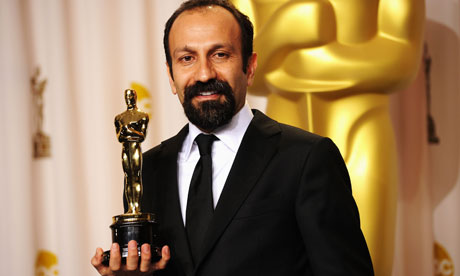
A ceremony to honour the makers of Oscar-winning Iranian film A Separation has been abruptly cancelled by the Iranian authorities, despite official praise for the drama's victory over an Israeli competitor at the Academy Award ceremony last month.
Director Asghar Farhadi was expected to attend the event, organised by two of Iran's most high-profile cinema groups, the Centre for Directors of Iranian Cinema and the High Council of Producers of Iranian Cinema. However, the semi-official Ilna news agency yesterday said a permit had been denied, without giving any reason.
A Separation won the best foreign language Oscar, beating entries from Israel and three other countries, in Los Angeles on 26 February. It was the first time a film from the country had won an Academy Award, and Farhadi's movie also picked up a nomination for best original screenplay.
"We intended to have a simple and friendly meeting to say 'thank you' for the great achievement you brought Iran and Iranian cinema but the cultural custodians did not let us realise this," organisers of the ceremony told Farhadi in a statement. "We deeply regret this."
The cancellation comes as something of a shock because Iran's political leadership had appeared keen to label A Separation's victory a sign of the country's triumph over Israel at a time of extreme tension between the two nations. However, conservative figures close to Iran's leaders have previously criticised the film for insulting the Islamic republic – with hardliners concerned over the film's depiction of domestic turmoil, gender inequality and the desire of many Iranians to leave the country. In a programme broadcast in state-run television, writer Masoud Ferasati said: "The image of our society that A Separation depicts is the dirty picture westerners are wishing for." All public events in Iran require a government permit.
Iranian film-makers have often faced persecution from the authorities in the Islamic republic. Farhadi was himself refused permission to shoot A Separation in September 2010 after expressing support for fellow directors Mohsen Makhmalbaf and Jafar Panahi, respectively exiled and imprisoned by the regime for their film-making activities. Farhadi later apologised and was allowed to resume work.
Millions of Iranians stayed up all night to watch Farhadi pick up the Oscar last month and speak of the importance of recognising his country's glorious and essentially peaceful culture at a time of "war, intimidation and aggression". A Separation's popularity in Iran forced authorities to put the film forward for the Oscars, where it beat Belgium's Bullhead, Israel's Footnote, Poland's In Darkness and Canada's Monsieur Lazhar to win the best foreign film prize.

